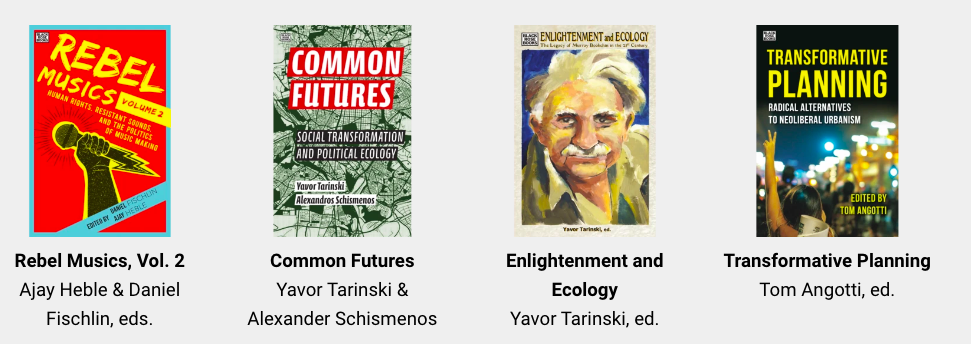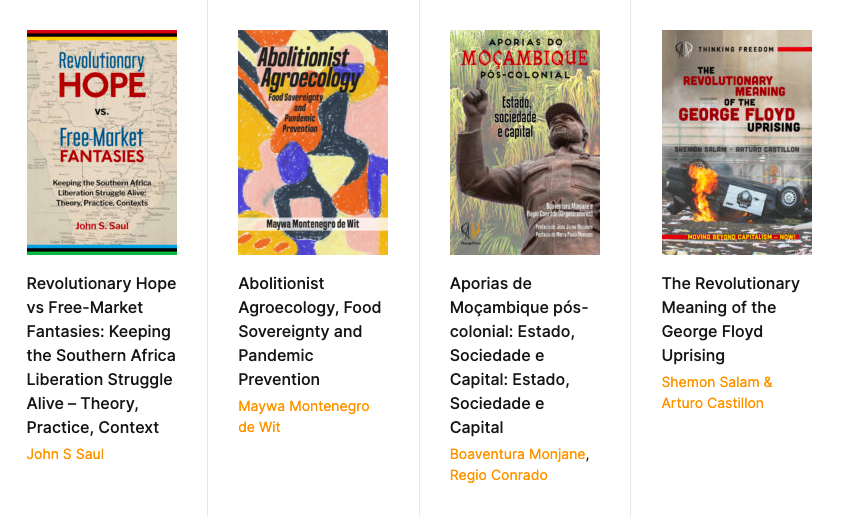These local publishers keep activist ideas alive in print
by Roxane Hudon
With the mainstream media focusing on the worst of the pandemic, tired politicians making inexplicable decisions and, on the publishing side, the seemingly unending swell of the hungry behemoth that is Amazon, it’s easy to plummet into cynicism these days. But without a frustrating status quo, there wouldn’t be radical ideas about how to change it.
Radicalism exists to show us different ways of living or thinking, and these new ideas would often never be heard if it wasn’t for the passionate and tireless efforts of radical publishers. These publishers hold up a megaphone to the alternative voices that call us away from complacency and cynicism and lead us to activism and change.
Black Rose Books
In Canada, you can’t discuss radical publishing without talking about Black Rose Books. Founded in 1969 by Montreal-based publisher, editor, author, and activist Dimitri Roussopoulos, the press was one of the first of its kind here, born from a necessity to document boundless new ideas sprouting throughout the 60s and 70s. According to Black Rose Books’ Jason Toney and Clara-Swan Kennedy, some of the most notable feats of the press during its first decades included publishing a little-known Noam Chomsky, reissuing all of Russian anarchist Peter Kropotkin’s writings in English, and translating important works from francophone writers, such as Pierre Vallières, thus sharing the francophone experience to a wider, English-speaking audience in Canada and throughout the world.
Roussopoulos and Black Rose Books also published a journal titled Our Generation, which documented the threat of nuclear war and pushed for nuclear disarmament. “In Montreal, Our Generation was crucial in political movements like the Montreal’s Citizens Movement, and, together with Black Rose Books, was an important place for radical political ideology and municipal-based activism,” explains Toney.
Municipal politics eventually closed a chapter for Black Rose Books, when Roussopoulos and his publishing partner Linda Barton decided to call it quits in 2010 to work on different projects – for Roussopoulos, focusing on participating in Montreal’s urban politics. That’s when a new generation of radical publishers, including Nathan McDonnell, stepped in to continue the work of Black Rose Books.

For Toney, the press is still in a transitional phase over a decade later, as a result of the changes in publishing, but also, of the changes in radicalism. “What is defined as radical has changed a lot, and many of our books tend to be dated in that sense now,” says Kennedy. “For instance, anything we published about mass media before 2005 does not take into account current trends on the internet – at most they noted the potential outcomes. Our most recent edition of Mind Abuse updates the original in this way – expanding on contemporary internet/gaming culture. Books like Aboriginal Peoples or Challenge of Diversity are dated in that conversations around Indigenous peoples and around identity have evolved since they were originally published,” she explains. “The mission hasn’t entirely changed, but it has to adapt to the new radicalisms that are generating. We would like to bring a younger generation in to try and move in the right direction of what the culture is,” she adds.
The press is also facing the challenges of a changing publishing landscape, changes they say have been aggravated by the pandemic, which has sped up the push towards digital publishing and print-on-demand. Toney and Kennedy say Black Rose Books is leaning into the changes, instead of shying away from them. Aside from online events and a greater social media presence, they’ve also launched a new website that will host a feature called the Open Book Reader, allowing people to read the entire eBook version of most books for free – “like Bandcamp for books,” explains Kennedy.
A few of the countless forthcoming titles worth discovering from Black Rose Books that Toney and Kennedy highlighted during our conversation include Kropotkin Now! Life, Freedom & Ethics (a centenary celebration of Peter Kropotkin’s ideas through essays), Weaving Another World: Jineolojî Committee in Europe (an exploration of feminist science proposed by Kurdish women), and A Citizen’s Guide to City Politics: Montreal (about the future of citizen movements in Montreal).

Daraja Press
Another radical press leaning into the new digital realities of the publishing world is Daraja Press. Activist, publisher, editor, activist, and founder of the press Firoze Manji explains that readers can now choose to pay what they can for the eBook version of most of Daraja’s books and pamphlets, with a suggested price shown for each. It’s a model that’s worked so far: “Sixty to seventy percent who download make a donation,” says Manji, adding that many customers have especially proven generous during the pandemic. It’s also a model that aligns with Daraja’s mandate, to introduce the writers and radical ideas stemming from the low- to middle-income countries of the “Global South” to as wide an audience as possible.
While the press might not share the decades-long history of Black Rose Books in Canada, Manji, originally from Kenya, has dedicated most of his life to activism and radical publishing, boasting a ridiculously impressive CV that ranges from working as a prison dentist to being a board member of Greenpeace Africa. When Pambazuka Press, the radical African press that he helped found, stopped publishing books, Manji decided he wanted to continue. Thus, Daraja Press was born with a first book published in Senegal in 2013. It then followed Manji to Ghana, back to Kenya, before landing in Gatineau, where Manji moved “for love.” “Love is at the core of my politics,” he says.

While the press has left its nomadic roots behind for a permanent home here, Manji says that “the Internet is our address,” explaining that the press’ focus is international and they’re here to educate Canadians, instead of simply showcasing Canadian writers and stories. For Manji, a book is the beginning of a process, a transformative work that gets people thinking and moves them towards activism. This is why Dajara Press has also begun publishing pamphlets, as an “introduction to books.” The importance lies in publishing the ideas and arguments first, so that they are broadcast in any medium that is the most accessible to people.
Tying in neatly with that idea is another new digital endeavour from Daraja Press: a podcast series entitled Organising in the Time of COVID-19, which explores the politics of the pandemic, its impact on communities around the world, and the reinforced creation of what Manji refers to as “sacred zones for the privileged and sacrifice zones for the poor.” Having accumulated hours of interviews since the beginning of the pandemic, he expressed the possibility of turning these conversations into a small book eventually.
You can listen to all episodes on the Daraja Press website and check out some of the press’s recent titles, including Abolitionist Agroecology, Food Sovereignty and Pandemic Prevention (a pamphlet that dissects racist food systems, how they lead to pandemics, and how they need to change), Fanon Today: The Reason and Revolt of The Wretched of the Earth (essays on Frantz Fanon from writers of the Global South), and Being Human After 1492 (an essay on how to change the racial ideologies that began with colonization in 1492).
Roxane Hudon is a full-time writer and frequent layabout. Currently a corporate sell-out/ “content creator,” but also a punk zine-maker, she has very strong opinions about very few things, including movies, books, Russia, and Harry Styles.
